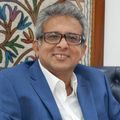Interviews
Clean India, Darden students aim to wring pollution
03 Apr '09
5 min read

Clean India will use algae and sand filtration to treat the contaminated water. The algae is grown in a patented bioreactor, and then introduced to open ponds of wastewater. The algae breaks down the toxic elements in the water into nonharmful elements. Then a sand filter captures any remaining sediments and particulates. The whole process takes about five days for a given batch of wastewater. The process can be customized by identifying strains of algae that are best suited to removing particular pollutants.
The process is labor-intensive, as workers must move water from pond to pond and separate the algae every day. This harnesses India's low-cost labor as a substitute for the high capital costs of traditional wastewater treatment equipment costing hundreds of thousands of dollars, Yekula said.
The modular system can be expanded as new customers are added. A 5-million-liter pilot treatment facility will cost $1.5 million. It should pay for itself in 18 months, Yekula said, and produce $4 million in revenue and $1 million in profits by the end of five years. By year five they hope to expand to 26 plants.
"India has a scarcity of water," Yekula said. "This problem is huge, but we think Clean India has a solution that actually makes a difference. ... It's not only solving a social problem, it's doing it in a very profitable way.”
Clean India has not yet lined up financing for the pilot facility, but investors and venture capitalists have expressed interest, Yekula said. "With the global economic meltdown, people are looking for places to invest where there will still be at least some growth, and India is still growing."
"I'm from India myself, so I feel a deep empathy for any kind of problem-solving in India," said Saras Sarasvathy, an associate professor at Darden who has been an adviser to the team.
"If Ravi and Baijnath can show their model works in one place, they could go lots of places, and they now have the education and vision to think about how to scale it up," Sarasvathy said. "That's what separates them from being just another successful entrepreneur in India. But I tell them, 'You have to get that first piece done. But if you can get it done, it could be a big solution.'"
The process is labor-intensive, as workers must move water from pond to pond and separate the algae every day. This harnesses India's low-cost labor as a substitute for the high capital costs of traditional wastewater treatment equipment costing hundreds of thousands of dollars, Yekula said.
The modular system can be expanded as new customers are added. A 5-million-liter pilot treatment facility will cost $1.5 million. It should pay for itself in 18 months, Yekula said, and produce $4 million in revenue and $1 million in profits by the end of five years. By year five they hope to expand to 26 plants.
"India has a scarcity of water," Yekula said. "This problem is huge, but we think Clean India has a solution that actually makes a difference. ... It's not only solving a social problem, it's doing it in a very profitable way.”
Clean India has not yet lined up financing for the pilot facility, but investors and venture capitalists have expressed interest, Yekula said. "With the global economic meltdown, people are looking for places to invest where there will still be at least some growth, and India is still growing."
"I'm from India myself, so I feel a deep empathy for any kind of problem-solving in India," said Saras Sarasvathy, an associate professor at Darden who has been an adviser to the team.
"If Ravi and Baijnath can show their model works in one place, they could go lots of places, and they now have the education and vision to think about how to scale it up," Sarasvathy said. "That's what separates them from being just another successful entrepreneur in India. But I tell them, 'You have to get that first piece done. But if you can get it done, it could be a big solution.'"
University of Virginia
Popular News
Leave your Comments
Editor’s Pick
Folker Stachetzki
Brother Internationale Industriemaschinen GmbH
































-Ltd..jpg?tr=w-120,h-60,c-at_max,cm-pad_resize,bg-ffffff)





.jpg?tr=w-120,h-60,c-at_max,cm-pad_resize,bg-ffffff)
.jpg?tr=w-120,h-60,c-at_max,cm-pad_resize,bg-ffffff)






